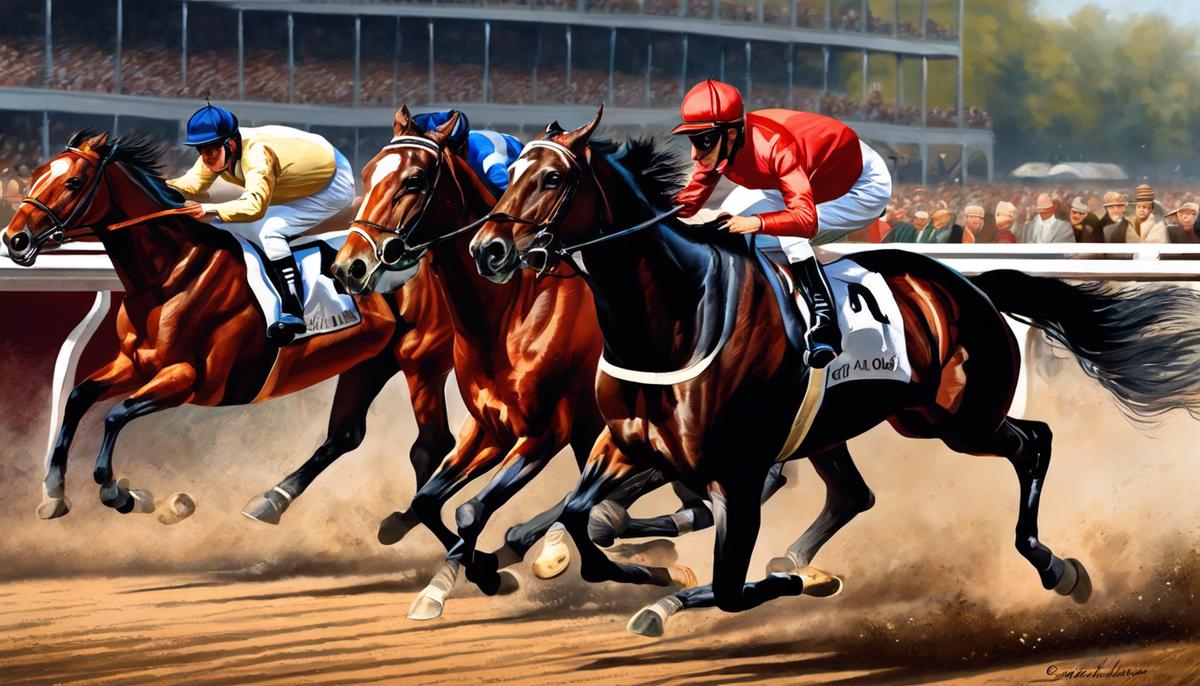Steeped in the rich soils of French history, the French Trotter stands as a proud testament to equestrian excellence, embodying agility, endurance, and the unyielding spirit of competition. With roots tracing back to the 19th century, these horses surfaced from a robust blend of English Thoroughbreds and local Norman mares, a partnership that galvanized not just a new breed, but an entire sporting tradition. Their storied evolution from agricultural laborers to racetrack champions portrays not only a chronicle of the breed but an unfolding tapestry of France’s own cultural journey. Beyond the annals of racing, the French Trotter’s distinctive physique and equable temperament have carved a niche in various equestrian disciplines, an enduring legacy that continues to captivate enthusiasts and experts alike.
Table of Contents (Horspedia)
History and Origin of French Trotters
The Rise of the French Trotters: A Tale of Elegance and Endurance
Uncovering the legacy of French Trotters is like diving into a storybook of equine excellence. This breed, with its distinct trotting talent, has galloped its way into the hearts of horse enthusiasts worldwide. But how did these magnificent creatures transform from mere carriage horses to champions of the track?
In the mid-19th century, French horse breeders had a goal: to create the ultimate trotting horse. The recipe was simple yet revolutionary. They mixed native mares of Norman stock with swift Standardbreds and noble Thoroughbreds from across the sea. This genetic cocktail created horses with a fast, enduring trot that seemed to captivate anyone who watched.
The magic truly unfolded on the racetrack. French Trotters took to harness racing like a fish to water, showcasing their unique gait that was both swift and stylish. Imagine these powerful beasts, with their muscular frames and graceful strides, pulling a sulky with a driver behind them, flying across the finish line in a display of sheer athleticism. It was a sight to behold, and it signaled the dawning of these trotters as stars of the sport.
What’s more, French Trotters turned out to be incredibly versatile. Not just speedsters, these equines were also excellent for riding, showing that strength and elegance could indeed go hoof in hoof. They began carving out a niche in endurance riding, further proving their status as multi-talented athletes.
The success of the French Trotter did not go unnoticed. In fact, the breed became so celebrated that France established an official studbook in 1922, cementing their place in equine history and ensuring the purity and excellence of the breed for generations to come.
Today, the French Trotter stands proudly as a symbol of horse racing prowess and versatility. Its contribution to the world of equestrian sports is undeniable. From humble beginnings pulling carts through the French countryside to racing glory and beyond, the French Trotter has truly made a name for itself as a distinguished and cherished breed.
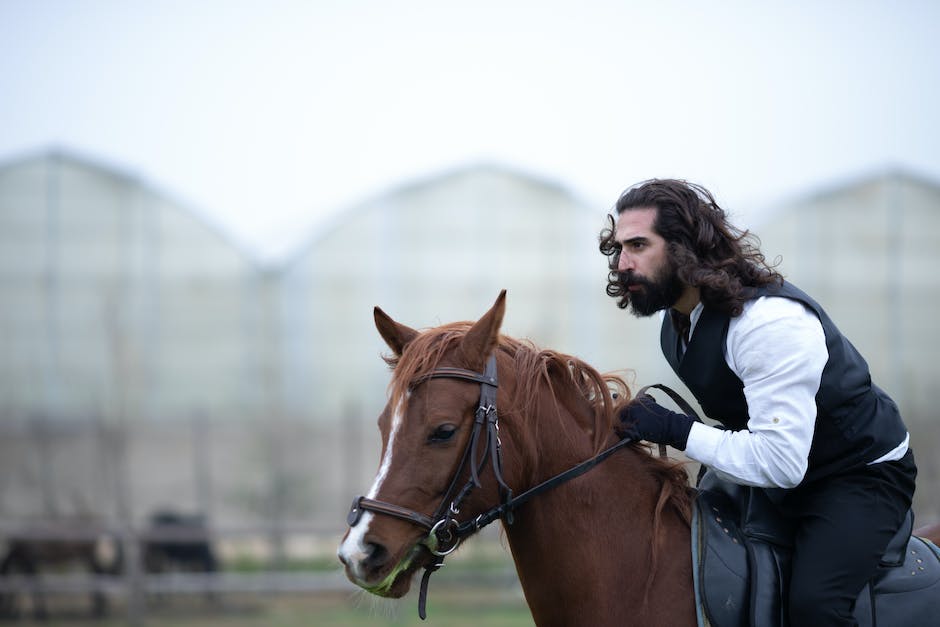
Physical Characteristics and Temperament
When exploring the equine world, French Trotters truly stand out, captured in their distinct personality and physical characteristics. These special traits have paved the way for their recognition and flourishing across various equine disciplines.
Personality shines bright in these horses. Known for their keen intelligence, French Trotters are as sharp as they are swift. This cognitive agility translates to rapid learning and adaptability on the track or trail. Trainability is a breeze with these horses, due to their attentive and cooperative nature. The serene temperament characteristic of French Trotters means they not only excel in the fierce competition of harness racing but also serve as reliable companions for leisurely riding.
Delving into their looks, French Trotters sport an impressive physique. Their solid build provides the necessary strength for the grueling demands of harness racing, yet retains enough elegance for competitive show events. They often exhibit coats in rich bay, chestnut, or black, adorned with a sleek sheen that catches the eye. Watching a French Trotter mid-stride is to observe a masterful balance of power and grace.
In terms of health and longevity, French Trotters have the upper hand. Notoriously hardy, they are less prone to health issues compared to other purebreds. Their resilient nature ensures they have a long athletic life, often outperforming other breeds well into ages that would see others retired.
The breed’s impact on the world has been far-reaching, most notably through their contributions to genetic advancement in trotting lines worldwide. French Trotters have become global ambassadors of the trotting domain, influencing the development of trotter breeds elsewhere. Their genetics are sought after, providing the cornerstone for new, dynamic equine bloodlines that continue to invigorate trotting disciplines the world over.
Lastly, the French Trotter’s influence extends beyond the race track and into the very fabric of the horse community. They capture hearts of riders and horse aficionados, allured by their unique blend of speed, intelligence, and fortitude. Whether it’s a serene trail or the lightning-fast circuit of a racing oval, the French Trotter stands as a versatile, timeless breed, a testament to the enduring bond between human and horse.
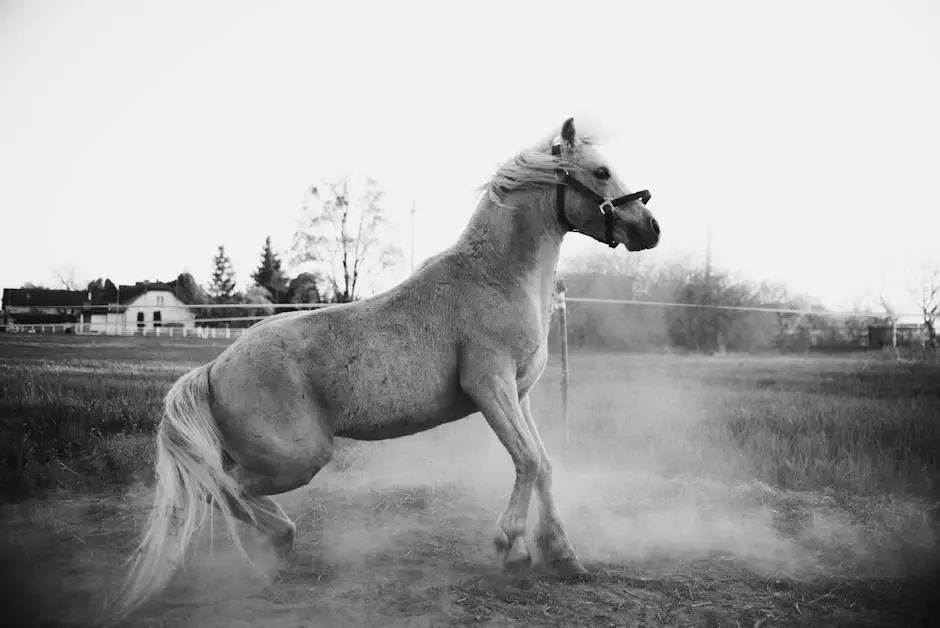
Training and Racing Techniques
Unlocking the Winning Trot: Training French Trotters for Success
Training a French Trotter, with their impressive pedigree and versatile capabilities, requires a nuanced approach that respects their intelligence and caters to their physical strengths. When aiming for success in either harness racing or other equestrian disciplines, there are several key factors that need to be taken into account. These secrets can help turn a promising French Trotter into a shining star on the track or in the show ring.
Firstly, consistency is king. French Trotters respond well to a clear and consistent training routine. This doesn’t mean that every day should be a repeat of the previous one, but having a stable framework for training helps these horses to understand what is expected of them. Regular workouts are important, and these should vary between long, low-intensity exercises and short, high-intensity sessions to build both stamina and speed.
Another secret lies in the art of mental stimulation. French Trotters are intelligent creatures who thrive when their minds are engaged. Incorporating a variety of activities beyond the trotting discipline, such as trail riding or basic dressage movements, can enhance their cognitive abilities while keeping training fresh and interesting.
Moreover, the temperament of French Trotters—calm yet focused—should be harnessed with positive reinforcement techniques. Rewarding good behavior and successful completion of tasks with treats, pats, and words of encouragement will boost their confidence and strengthen the bond between horse and trainer.
Focus on the foundation of any horse’s health: nutrition and care. A balanced diet specifically tailored for performance horses, along with regular veterinary check-ups, hoof care, and dental maintenance, is crucial. Remember, a healthy French Trotter is more likely to perform consistently and at a high level.
Harness the power of teamwork by involving the French Trotter in the training process. Allow them to have a say in their work by paying close attention to the subtleties of their body language and feedback. If a particular exercise seems to be causing stress or discomfort, it is time to reassess and adjust accordingly. This respectful two-way communication enhances their natural willingness to cooperate.
Lastly, building on their innate strengths undoubtedly sets them up for triumph. French Trotters are not just designed for speed; they also possess elegance and endurance. Capitalize on these traits by customizing workouts that allow these horses to develop their full spectrum of abilities. Whether it is increasing their stamina for long-distance events or refining their movements for show class elegance, their training should highlight these inherent skills.
Empower the French Trotter with these success-oriented strategies, and watch as they amaze enthusiasts with their agility, power, and performance – whether they’re trotting along a misty morning track or showcasing their finesse under the bright lights of a competition ring. With understanding, dedication, and skill, these French treasures can and do rise to the very pinnacle of equestrian excellence.
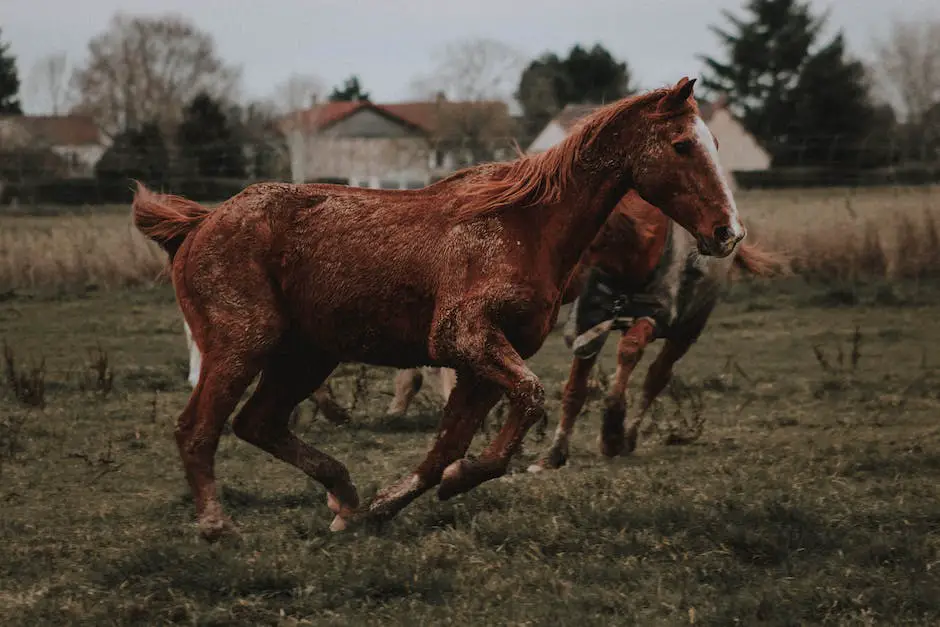
Breeding and Bloodlines
Delving into the realm of top French Trotters, it’s intriguing to explore the pedigree lines and breeding practices that consistently produce the crème de la crème of this storied breed. Successful breeders know it’s a delicate dance of genetics, care, and training that leads to excellence.
Bloodlines are pivotal when discussing elite equine athletes, and French Trotters are no exception. Prestigious bloodlines constitute the backbone of the French Trotting world. Names like Fandango, Caprior, and Kerjacques reverberate with esteem in trotting circles, representing lines with a proven track record of speed and stamina. These forebears have founded dynasties through careful selection and mating, yielding offspring that excel in trotting venues and endure in competitive circuits.
The defining practices of breeding top-notch French Trotters rely not only on distinguished lineages but also on strategic pairings. Modern breeders meticulously match sires and dams, aiming for a harmonious blend of speed, endurance, and temperament. They’ll lean more towards a sire with a record-breaking trot if a mare’s lineage is flush with endurance, creating progeny ready to best their ancestors on both fronts.
The secret sauce in the upbringing of a French Trotter destined for greatness isn’t just found in their genes. Training and care are equally crucial. Effective trainers employ consistent routines that French Trotters come to anticipate and thrive on. Their education commences early, and a rhythmic pattern of conditioning builds both physique and mental acuity. This consistency promotes trust and fosters a work ethic that champions require.
Mental stimulation goes hand in glove with physical training. These horses exhibit a sharp wit, keen to engage in a variety of tasks that challenge and engross their active minds. Introducing complexities such as varied terrain, obstacle work, and diverse training exercises not only prevents monotony but also sharpens their innate abilities.
A positive reinforcement approach harnesses the natural eagerness of French Trotters to perform. Rewarding correct gait patterns and compliance nurtures a positive association with work, reinforcing desirable behaviors and promoting a willing partner in the rigors of training.
Nutrition and proper care cannot be overstated in the upkeep of a French Trotter. A balanced diet, rich in nutrients, powers these athletes. Regular health checks, vaccinations, and attention to hooves and teeth round out the regimen guaranteeing tip-top condition. The endurance and health of this breed are dependent on such dedicated stewardship.
Moreover, an intuitive practice that sets apart the grooming of top performers is involving them in their training regime. Listening to the horse and recognizing its feedback accelerates progress. Harnessing the strengths of each individual dissected through observation and interaction helps tailor a bespoke training agenda aligned with the horse’s natural proclivities.
Ultimately, the French Trotter continues to be a magnificent confluence of equine traits. A history of select breeding, underpinned by generations of horsepersons devoted to their calling, has chiseled a breed renowned for its grace under pressure, athletic versatility, and a steadfast heart. It remains a testament to the coordinated efforts of artful breeding, patient training, and dedicated care that uphold the legacy of the exceptional French Trotter.
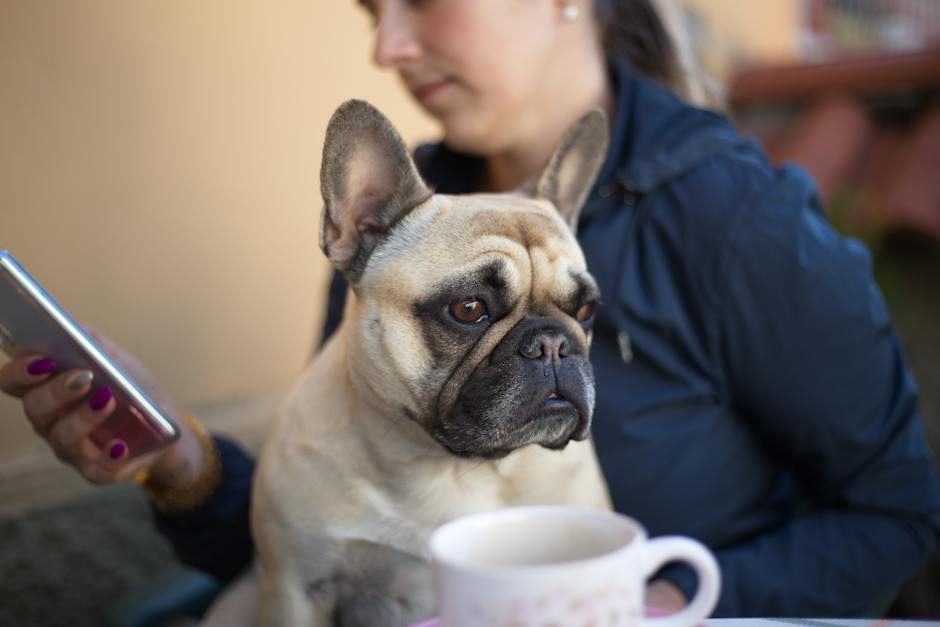
The French Trotter’s saga is far from reaching its final furlong. With meticulous breeding and an unwavering commitment to excellence, the continuation of this distinguished breed promises an exciting future. The synthesis of rigorous training, strategic racing, and conscientious breeding practices is critical to nurturing the inherent potential within each foal. As we traverse the complex labyrinth of genetics and lineage, the French Trotter breed emerges not merely as a symbol of past glories but as a beacon for innovation and integrity in the equine world. It is within the heartbeats of these majestic animals that the pulse of their lineage thunders onward, resounding with the promise of tomorrow’s victories.
